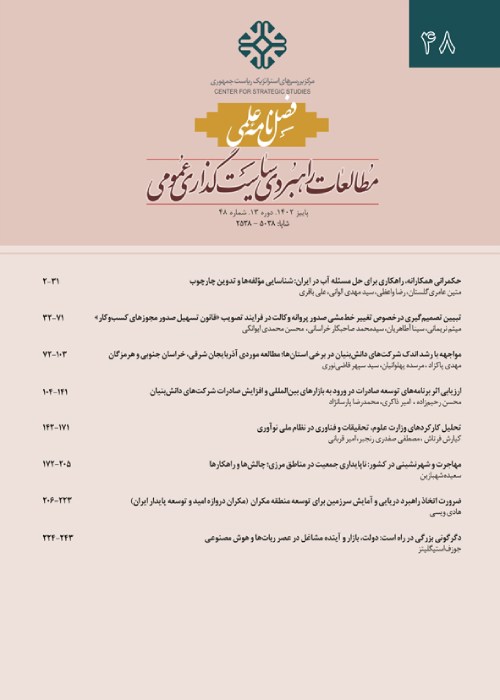Government, Development and Financial Reforms in the Globalized Atmosphere
Abstract:
Intense compression of time and space, expanded transportation of goods and people in the terminals, fading the boundaries of sovereignty of national governments in the penetration of transnational institutions, ever-increasing trade and capital flows, remarkable contacts and encounters of cultures and past ideas, due to expansion of communications and development of technology which in recent decades has been the peak intensity, are the signs of the phenomenon that we learn it as Globalization. This phenomenon depending on national, regional and international conditions creates areas and different implications of countries such as profitable opportunities and costly restrictions. From methodological point of view we consider the globalized atmosphere as a structure, the range of restrictions provided by this structure for powerful agents in each level can be opportunity maker and for weak limited and costly. As far as developing countries are related, their choices are limited in dealing with this phenomenon. They will possess the opportunities and blessings in this field by increasing their capabilities and capacities simultaneously in order to face and adapt to new environment, so they can fulfill the national development program as a basic need and secure themselves against the damages of this process. It seems in this compressed time and space, governments and the ruling elites in these countries are the most important agents of development program and ought to assume modernization and reform management in the fundamental areas. These governments must be reformed in terms of basic physical infrastructure, institutions and policies (the policy making and governance approaches) to generate power and empowerment for the country in order to adapt to the new atmosphere requirements. All these triple reforms led to increase public spending and make crucial the need for appropriate policy making in the financial area. In this paper we discussed about the subject at hand with a view to modernization and institutional reforms in developing countries (with emphasis on Iran and not a case study) and have shown that the process of reform and economic liberalization in these countries lead to increase public spending which necessitate the need of reforms in the financial area and optimization of the tax system.
Keywords:
Language:
Persian
Published:
Journal Strategic Studies of Public Policy, Volume:3 Issue: 6, 2012
Page:
115
magiran.com/p1130233
دانلود و مطالعه متن این مقاله با یکی از روشهای زیر امکان پذیر است:
اشتراک شخصی
با عضویت و پرداخت آنلاین حق اشتراک یکساله به مبلغ 1,390,000ريال میتوانید 70 عنوان مطلب دانلود کنید!
اشتراک سازمانی
به کتابخانه دانشگاه یا محل کار خود پیشنهاد کنید تا اشتراک سازمانی این پایگاه را برای دسترسی نامحدود همه کاربران به متن مطالب تهیه نمایند!
توجه!
- حق عضویت دریافتی صرف حمایت از نشریات عضو و نگهداری، تکمیل و توسعه مگیران میشود.
- پرداخت حق اشتراک و دانلود مقالات اجازه بازنشر آن در سایر رسانههای چاپی و دیجیتال را به کاربر نمیدهد.
دسترسی سراسری کاربران دانشگاه پیام نور!
اعضای هیئت علمی و دانشجویان دانشگاه پیام نور در سراسر کشور، در صورت ثبت نام با ایمیل دانشگاهی، تا پایان فروردین ماه 1403 به مقالات سایت دسترسی خواهند داشت!
In order to view content subscription is required
Personal subscription
Subscribe magiran.com for 70 € euros via PayPal and download 70 articles during a year.
Organization subscription
Please contact us to subscribe your university or library for unlimited access!


